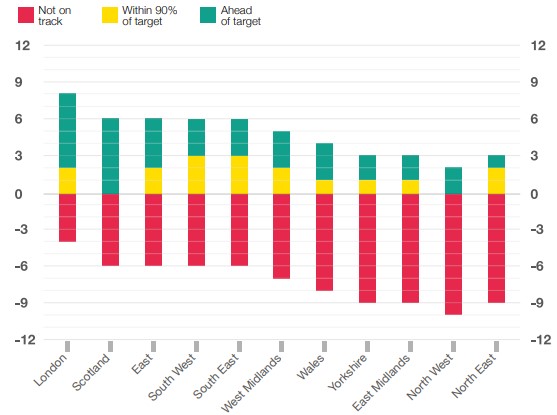The changing role of cities and local energy – does energy system governance need to catch up?
Jess Britton, IGov Team, 26th November 2018
It is now widely accepted that the transformation of the UK energy system is well underway with changes to technologies and business models, as well as evolving consumer preferences, challenging many of the principles and structures of the existing centralised and supply focussed energy system. At the same time there is growing consensus that local approaches to energy system change are becoming more important. This blog reviews the changing focus in the UK on the local dimension of energy system change and emphasises the potential for energy decarbonisation to progress at different speeds, and deliver very different outcomes, in different areas of the UK. Given the need for rapid and coordinated change across the UK in order to meet climate change commitments the renewed focus on local energy systems needs to go beyond local experimentation and think about how the roles and relationships between different scales of governance should develop to make sure decarbonisation delivers for everyone in the UK.
The term ‘local energy’ tends to refer to a wide range of projects – across supply and demand, and at a range of scales – which are united by being coordinated at a sub-national scale through local and combined authorities, distribution network operators, community groups and industry partnerships. Local authorities and Local Economic Partnerships (LEPs) tend to play an important coordinating role in such approaches and there is extensive history of local action on climate and energy in the UK and globally (see here and here). UK Government policy documents have long recognised that action at the local scale is important in energy system change, but action to formally support the local scale has been limited. Local authorities have few statutory roles in energy and climate with policy and regulation delivered nationally and the local governance of energy infrastructure restricted to planning powers for projects up to 50MW. LEPs are focussed specifically on local economic growth and have historically not had a formal mandate to consider energy.
Despite this, there has recently been renewed interest in the role of local energy systems driven by acknowledgement that a local understanding of energy resources, supply and demand will be essential to deliver a smart, flexible, decarbonised energy system. Increasing proportions of renewables and storage are decentralised and – together with the ongoing digitalisation of energy – this is incentivising the development of local approaches to balancing supply and demand. Additionally much heat decarbonisation infrastructure (such as efficiency measures and heat networks) and electric vehicle infrastructure needs to be planned and delivered on a local scale.
The Government’s Industrial Strategy, Clean Growth Strategy and Smart Systems and Flexibility Plan all emphasise the role of local approaches to energy system decarbonisation. This includes the Industrial Strategy highlighting ‘place’ as one of the 5 foundational principles, and the allocation of significant funding for local energy approaches through the Prospering from the Energy Revolution (PFER) Challenge Fund. Under the PFER the Government, via Innovate UK, has up to £41.5 million to invest in local smart energy systems. Up to £40 million is available for 3 smart energy system demonstrators based in medium to large cities, and up to £1.5 million is available for concept and design studies into new, smarter approaches to local energy. The PFER aims to prove by 2022 that new, smarter, local energy approaches can deliver cleaner, cheaper energy services and more prosperous and resilient communities.
Both the Industrial Strategy and the Clean Growth Strategy emphasise that the UK’s cities, towns and rural areas have diverse strengths and resources in relation to energy, and that effective local leadership will play an important role in maximising the local benefits of decarbonisation. This results in a focus on anchoring economic growth in the strengths of local areas, with LEPs tasked to develop their own local industrial strategies. In this context the local energy governance framework currently largely consists of (1) scope to incorporate energy commitments into Local Devolution Deals, (2) support for all LEPs to deliver local energy plans by the end of 2018 and (3) the development of five Local Energy Hubs across the country to work with LEPs to develop self-sustaining pipelines of energy projects by 2020. The role of DNOs is also set to transform and they are increasingly seeking to carry out local distributed energy resource assessments in order to identify and contract the flexibility and non-network solutions which are at the centre of the transition to DSO (see here for IGov’s thinking on how the DSO/DSP role should develop, together with the need for more ambition on RIIO2 outputs).
What the local economic growth focus of the Industrial Strategy and Clean Growth Strategy does not emphasise is that the benefits and impacts of decarbonisation are likely to be unevenly spread across the country, with winners and losers. Instead the assumption is that leading areas will deliver local demonstrators and new business models that will then be scaled up nationally. This is despite analysis by UCL indicating that most decarbonisation scenarios have the potential for significant regional economic disparities, and the Climate-KIC suggesting that a handful of city regions are likely to dominate the growth of climate innovation clusters. Just last week a report by Imperial Consultants indicated that progress on decarbonisation, and the benefits being experienced, have significant regional variations (see the figure 1).

Figure 1: Progress against power, transport and buildings across English regions, Scotland & Wales
Source: Imperial Consultants, 2018
In addition to the increasing focus on local energy a parallel, ongoing process of political decentralisation is happening with the advent of city mayors, devolution deals and combined authorities. This has taken place at the same time as unprecedented financial pressure on local authorities, as well as the refocussing of funding from a central settlement to the local collection of council tax and business rates. Whilst the extent to which localism is empowering local actors is contested, these developments are certainly creating new momentum and drivers at the local level with some seeing greater involvement in energy systems as a way to both deliver wider social objectives and develop revenue streams.
Clearly local areas will have differing starting points (for example more or less energy efficient housing stock or existing expertise in low carbon technologies) and decarbonised power, heat and transport systems will look somewhat different across the country (for example reflecting levels of renewable resource or scope for the role out of heat networks). However leaving local energy to develop in a way that see’s already successful areas with well-resourced local institutions powering ahead, whilst other less resourced or experienced areas fall behind, risks creating an energy system that is more unjust, as well as making it more likely that the GHG reduction targets will not be met.
Whilst the additional national focus on, and resources for, local energy outlined above is welcome it remains to be seen if these rather short-term, economic growth focussed measures will be sufficient to drive consistent action across the country, or just further embed existing regional disparities. A more comprehensive and long-term governance framework for local energy (and its links to the national picture) is one way to address this challenge. This should address questions about how the roles and responsibilities of different local actors may need to change, or be formalised, and how relationships between levels of governance are likely to need to develop. The United Nations Environment Programme refers to this as a need to ‘vertically integrate’ energy policy from central policy to local delivery, for example by incorporating cities into the design and development of national policies and monitoring the contribution of local areas to national carbon targets.
To discuss these issues in more depth IGov is bringing together a range of local, regional and national organisations from across industry, central and local government, and civil society to debate the role of local energy on 28th November. The event will be held under Chatham House rules but we plan to publish a report of the event in the following weeks. If you’re interested in discussing the event, or our work on local governance more broadly, please contact us.
Related Posts
« Previous Context and Agenda for Roundtable Global Insights: 27th November 2018 Next »








